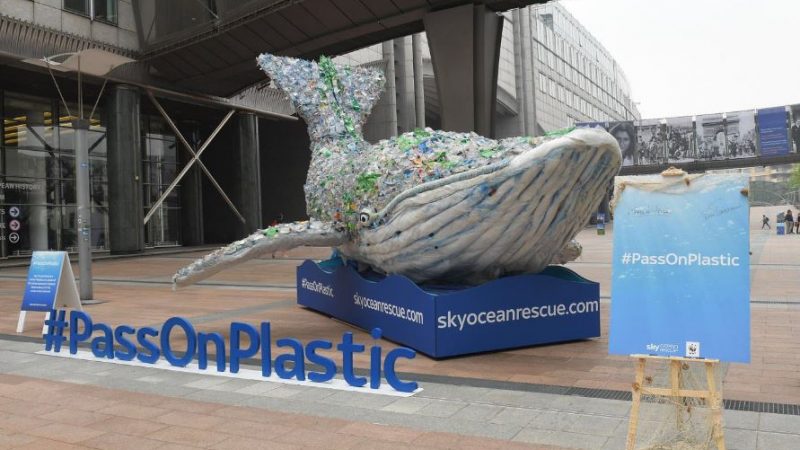Don’t waste a moment!
In the defense of EU Plastic Strategy

Source: Sky Ocean Rescue
I went to a breakfast event yesterday morning. I cut my croissant with a plastic knife, ate it from a paper plate and completed the meal with an orange juice from a plastic cup. For lunch, I had a salad near my office. The different mixes of greens were already packed in a plastic bowl, I only had to choose what else to add. Before going home, I felt like having a smoothie. I got it in a plastic cup again. I felt terribly ashamed by the end of the day.
According to the European Commission, 167 kg of packaging waste was generated by an average EU citizen in 2015, and around 110 kg out of it was recycled. The national statistics show huge differences, though. The German produced more than 220 kg (and recycled around 150 kg), while the Croatian wasted a bit more than 50 kg and recycled nearly the same proportion, the two-thirds of it.
We do especially badly in terms of plastic waste recycling: less than 40 percent of our bottles, cups and bags are recycled in the EU. It’s another average of course, with some outstanding national records, like the one of Germany where more than 90 percent of PET bottles are recycled.
I use again and again the word “recycling” on purpose. Because it only means that the waste was selectively collected and something happened to it. It doesn’t imply that the plastic bottles were reused again or transformed into a new bottle. In the case of the eminent Germany, only 40 percent of the PET bottles gain a new life as a bottle again. The rest is either transformed into a different plastic object, or simply burned.
These statistics refer only to the world-champion of waste management. In many EU countries, the culture of selective waste management doesn’t exist at all. However, they don’t produce that much waste either. So, this is the point where we get back to my plastic waste production from yesterday. I should have received all of those food and drinks in porcelain and glass containers.
The European Commission is supposed to present its Plastic Strategy at the end of this month. According to a draft leaked this week, the Commission proposes to completely ban or considerably reduce the circulation of some single-use plastics, like cutlery, plates, straws and beverage stirrers. While this “directive on the reduction of the impact of certain plastic products on the environment” is supposed to be only one piece of a whole strategy, scientists and lobbyists from the concerned sectors have already started to criticize the proposal.
Yes, badly functioning collection systems should be improved. Yes, the directive doesn’t precise by which materials the plastic should be substituted. Yes, oxo-biodegradable plastics might cause a lot of harm for the environment. And, yes, it is far beyond my expertise to develop a reasoned and scientific opinion about waste management.
But as an old student of European studies and proud pro-European, I must say that the Commission’s normative role in environment protection should always be praised. There is still a lot work to be done, but the EU is still the clearest and the greenest part of the world, due to the long decades of regulatory efforts. Just remember the Brexit campaign: even the fiercest supporters of the leave vote admitted that the sea sides got considerably cleaner due to the EU standards.
When I was a child, whatever you bought in a shop, you received it in a plastic bag. Now, due to the EU regulation, the consumers have to pay for it. It has even become fashionable to carry reusable bags.
There are many EU environment-protection rules that we don’t recognize by now because they have become part of our culture. If the Commission decided to ban straws or plastic knifes, after some months, we wouldn’t even remember how it was before. The EU’s biggest achievement is that it creates a community of norms and values. This is why the Plastic Strategy is great, no matter how imperfect it is.
